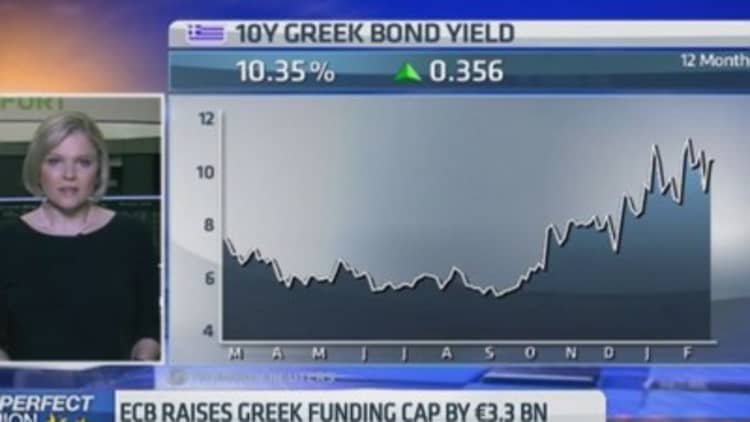
In the midst of the dramatic showdown in Brussels between the new Greek government and its European creditors, many Greek depositors—spooked by the prospect of a Greek default or, worse, an exit from the euro zone and a possible return to the drachma—have been pulling euros out of the nation's banks in record amounts over the last few days.
The Bank of Greece and the European Central Bank won't report official cash outflows for January until the end of the month. But sources in the Greek banking sector have told Greek newspapers that as much as 25 billion euros (US $28.4 billion) have left Greek banks since the end of December. According to the same sources, an estimated 900 million euros flowed out of Greek banks on Tuesday alone, the day after the talks broke up in Brussels, sparking fears that measures will be taken to stem the outflow. On Thursday, by mid-afternoon, deposits had shrunk by about 680 million euros (US $773 million).
"If outflows reach 1 billion euros, capital controls might need to be imposed," said Thanasis Koukakis, a financial editor for Estia a conservative daily, and To Vima, an influential Sunday newspaper.
On Thursday, Germany rejected Greece's application to extend its loan agreement for four months and renegotiate the terms of its bailout, raising the threat of Athens' running out of money in the coming weeks. Under the current program, the country has received 240 billion euros, or $272 billion, in exchange for pursuing various overhauls.
Read MoreGermany rejects Greece's application to extend its loan agreement
This came just one day after the European Central Bank extended for two weeks a 68 billion euro emergency liquidity package for Greek banks. According to a source close to the banking community, Greek banks must report cash outflows to the ECB and the Bank of Greece three times a day.
The situation remains volatile, as the Greek government and its European creditors have not yet managed to reach a deal over financing arrangements concerning the bailout. Greece's proposal included language that indicated it would not comply with the conditions set in that agreement. The loan agreement formally expires on Feb. 28.
Capital takes flight
Meanwhile, Standard & Poor's issued a report Thursday that risks of contagion if Greece defaults and leaves the euro zone are less financially risky for the remaining countries in the euro zone than in 2012, the last time fears of a Greek exit from the euro zone surfaced.
"All things considered, we believe that a Grexit would not lead to a degree of direct contagion that would drive other sovereigns out of the euro," said Standard & Poor's credit analyst Moritz Kraemer in a press release. The credit agency last week cut its long-term credit rating to junk status to B- warning about its weak cash position.
With uncertainty clouding the immediate outcome, cash is likely to keep pouring out of Greek banks over the next few days. About 70 percent of the outflows can be attributed to Greek corporate accounts. And most of that is rushing out of the country via electronic transfers to bank accounts elsewhere in the euro zone, Switzerland or the United Kingdom.
But many Greek citizens—who account for about a third of the deposit outflow—seem to be taking their cash out of the bank and placing it in safe deposit boxes or even just taking it home and literally stashing it under their mattresses. Burglaries, not surprisingly, are on the rise.
Read MoreGreece: Will Syriza or its creditors blink first?
Earlier this week in the village of Sfinari, outside of the city of Chania in Crete, a 78-year-old man and a 66-year-old woman were found stabbed to death in the bedroom of their home Tuesday. The room, police told reporters, had obviously been searched; a dresser drawer lock was broken, and an intended robbery was the likely motive. Police reportedly found thousands of euros in the couple's car and elsewhere in the house.
If outflows reach 1 billion euros, capital controls might need to be imposed.Thanasis Koukakisfinancial editor, "Estia" and "To Vima"
Like so many Greeks in the last few weeks, the couple appears to have pulled large amounts of cash out of the bank because of the economic uncertainty that looms over the country. They weren't alone. One Athenian real estate attorney, Roxani Avgerinou, said an older man stood in front of her in the bank in late January and demanded that the teller give him his 10,000 euros right then and there. She said he was told to come back the next day.
"I'm embarrassed to admit it, but my husband and I took all our money out of the bank and put it in a safe deposit box," said one young mother of two boys, who didn't want to give her name.
Panic is not widespread, however, at least on the surface. In other words, a run on the bank isn't quite what's happening. And part of the reason is that Prime Minister Tsipras has promised the era of austerity will soon be over, and most Greeks believe him. Indeed, nearly 8 in 10 Greeks give Prime Minister Alexis Tsipras a thumbs-up for how he is handling his first month in office, according to opinion polls.

The economic situation has been so dire in Greece over the last five years that many people are cash-strapped and don't have much money left to pull out anyway, say some observers. Unemployment hovers at 25 percent, and the country's economy has shrunk by close to 30 percent. Since the crisis unfolded, many Greeks with the means to do so have steadily sent money to other countries in Europe or are buying foreign bonds—or even investing in U.S. stocks.
In 2012, during the last crisis point, many Greeks sent cash to Cyprus, only to get burned. In March 2013 two banks failed—and depositors were covered for only 100,000 euros. In other words, a one-time bank levy on deposits essentially meant that everything over that amount was lost.
European Union rules guarantee as much as 100,000 euros per depositor should an institution fail. That won't help savers if the country where they hold an account exits the euro and wipes out their investments by devaluing a currency. That's precisely what's worrying so many Greeks. What if Greece goes back to the drachma? That possibility would leave even the cash in euros stashed at home or in safe deposit boxes worth a lot less.
—By Dody Tsiantar, special to CNBC.com
Correction: This story has been updated to reflect the correct currency conversion for the euro.

